英语写作大纲
(3.1-3)英语写作教学大纲

《英语写作》课程教学大纲课程代码: 3040107课程名称:英语写作英文名称:A Handbook of Writing课程类型: 必修课总学时: 64 讲课学时:32 实验学时:32学分: 4适用对象: 英语专业高年级学生先修课程:综合英语一、课程性质、目的和任务本课程适用于大学专科英语专业学生。
通过本课程的教学,学生可以了解必要的英语写作基础知识,培养熟练的英语写作能力,提高学生在信息时代用英语进行信息交流的能力。
学习本课程,要求学生具备一定的英语、阅读及写作方面的知识,要求学生掌握概要、摘要的写作规范和一般要求;掌握读书报告或其他种类报告的书写规范,并且内容切题,结构严谨,条理清楚,语法正确,语言通顺,表达得体;写作课结束时,学生应能够了解英语论文写作,并初步掌握基本修辞方法进行高一级的英语写作。
二、教学基本要求通过本门课程的系统学习,学生应了解基本的英语写作理论知识,即写作格式、遣词造句、修辞法、工具书的使用、句型等基本语言理论知识,合格文章的标准,即切题、连贯、简洁和长短句结合等写作技巧,以及主题句的写法、段落的结构和小结的写法等。
在实例分析的基础上,学生必须掌握各种句型的使用、主题句的含义和运用、段落的结构和写法等。
教学的重点是段落的写作,尤其要注重主题句的写法和展开。
三、教学内容及要求本课程教学总时数为64学时,其中讲授学时为32时,实践教学为32学时。
第一章:Using Proper Words教学时数:4学时教学重点:词的基本种类以及如何进行词的选择。
教学难点:近义词的辨析教学内容:第一节:Types of Words第二节:Choice of Words第三节:Synonyms第四节:Some Good Dictionaries第二章:Making Correct and Effective Sentences教学时数:12学时教学重点:1. 句子结构的完整性、主谓的一致性、如何用连词连接句子、复合句中的主句以及正确使用时态;2.有效的句子,包括句子的统一性、连贯性、准确性;句子的变化和句子的强调。
2024英语写作大纲

2024英语写作大纲Introduction:The importance of English writing skillsWhy a writing outline is necessaryI. Developing Writing SkillsA. Building a strong foundation in vocabulary and grammar1. Expanding vocabulary through reading and word exercises2. Mastering grammar rules through practice and studyB. Understanding different types of writing1. Narration2. Description3. Exposition4. ArgumentationC. Enhancing critical thinking1. Analyzing and evaluating information2. Organizing thoughts and ideas logically3. Developing coherent argumentsII. Structure of an English EssayA. Introduction1. Attracting the reader's attention with a hook2. Providing background information and context3. Presenting a clear thesis statementB. Body paragraphs1. Topic sentences to introduce main ideas2. Supporting details and evidence3. Transitions to ensure smooth flow between paragraphsC. Conclusion1. Summarizing main points2. Restating the thesis statement3. Offering a concluding thought or call to actionIII. Writing Techniques and StrategiesA. Using descriptive language1. Creating vivid images with sensory details2. Metaphors and similes to convey meaningB. Varying sentence structures and lengths1. Using simple, compound, and complex sentences2. Avoiding repetitive sentence patternsC. Employing persuasive techniques1. Appealing to emotions and personal experiences2. Providing facts and statistics for credibility3. Addressing counterarguments and refuting them effectively IV. Editing and ProofreadingA. Revision process1. Reviewing the overall structure and coherence2. Checking for clarity and logical flow3. Evaluating word choice and sentence structureB. Grammar and spelling check1. Using grammar tools and references2. Double-checking for typos and spelling errorsC. Peer feedback and professional editing1. Seeking input from peers and instructors2. Engaging professional editors to ensure quality Conclusion:The significance of following an English writing outline Continuous practice and improvement for effective writing The role of writing skills in academic and professional success Note:This outline is not following any specific format (such as "essay" or "contract") as mentioned in the instructions since the topic provided is about an English writing curriculum or syllabus for 2024.。
英语写作教学大纲
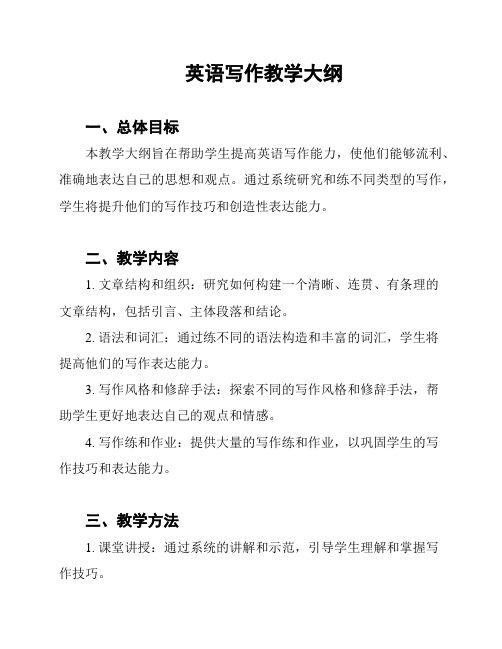
英语写作教学大纲一、总体目标本教学大纲旨在帮助学生提高英语写作能力,使他们能够流利、准确地表达自己的思想和观点。
通过系统研究和练不同类型的写作,学生将提升他们的写作技巧和创造性表达能力。
二、教学内容1. 文章结构和组织:研究如何构建一个清晰、连贯、有条理的文章结构,包括引言、主体段落和结论。
2. 语法和词汇:通过练不同的语法构造和丰富的词汇,学生将提高他们的写作表达能力。
3. 写作风格和修辞手法:探索不同的写作风格和修辞手法,帮助学生更好地表达自己的观点和情感。
4. 写作练和作业:提供大量的写作练和作业,以巩固学生的写作技巧和表达能力。
三、教学方法1. 课堂讲授:通过系统的讲解和示范,引导学生理解和掌握写作技巧。
2. 练和作业:提供充分的练和作业,以帮助学生在实践中巩固和运用所学的知识。
3. 个体指导:针对学生的写作作业,给予个体指导和反馈,帮助他们改进和提升写作能力。
四、评估方式1. 课堂参与:学生在课堂上积极参与讨论和练。
2. 作业评估:对学生的写作作业进行评估,包括内容的准确性、语言的表达和组织的合理性。
3. 考试:定期进行书面考试,以评估学生的写作能力和理解程度。
五、教材和资源1. 主教材:选取适合学生水平的英语写作教材,包括相关的写作范文和练题。
2. 辅助资源:使用多媒体教具和在线研究平台,提供丰富多样的研究资源和辅导材料。
六、时间安排本教学大纲按照学期进行安排,每周授课2小时,总共12周。
每周的授课内容包括教学讲解、练和作业布置。
七、预期效果通过本课程的研究,学生将能够:1. 熟练运用不同的写作技巧和表达方式。
2. 构建清晰、连贯、有条理的文章结构。
3. 表达自己的观点和观点,并支持其论点。
4. 提升写作的创造性和修辞水平。
5. 根据不同的写作任务,选择合适的词汇和语法结构。
6. 通过系统的练和实践,提高英语写作能力。
八、备注本教学大纲仅为参考,具体的教学内容和安排可以根据实际情况进行调整。
大学英语写作基础大纲
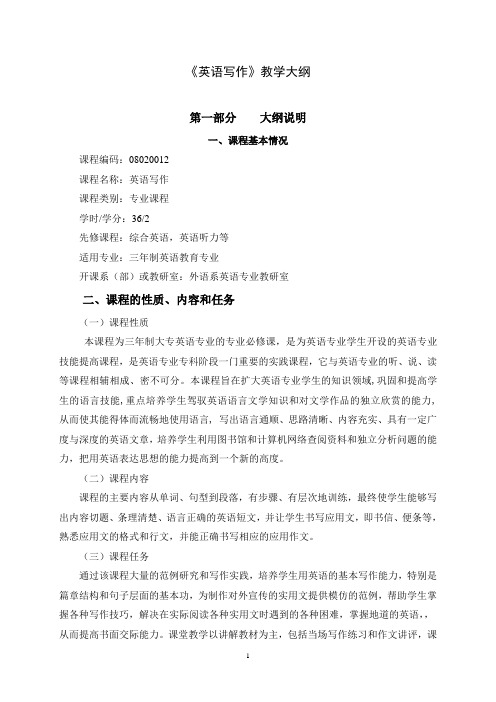
《英语写作》教学大纲第一部分大纲说明一、课程基本情况课程编码:08020012课程名称:英语写作课程类别:专业课程学时/学分:36/2先修课程:综合英语,英语听力等适用专业:三年制英语教育专业开课系(部)或教研室:外语系英语专业教研室二、课程的性质、内容和任务(一)课程性质本课程为三年制大专英语专业的专业必修课,是为英语专业学生开设的英语专业技能提高课程,是英语专业专科阶段一门重要的实践课程,它与英语专业的听、说、读等课程相辅相成、密不可分。
本课程旨在扩大英语专业学生的知识领域,巩固和提高学生的语言技能,重点培养学生驾驭英语语言文学知识和对文学作品的独立欣赏的能力,从而使其能得体而流畅地使用语言, 写出语言通顺、思路清晰、内容充实、具有一定广度与深度的英语文章,培养学生利用图书馆和计算机网络查阅资料和独立分析问题的能力,把用英语表达思想的能力提高到一个新的高度。
(二)课程内容课程的主要内容从单词、句型到段落,有步骤、有层次地训练,最终使学生能够写出内容切题、条理清楚、语言正确的英语短文,并让学生书写应用文,即书信、便条等,熟悉应用文的格式和行文,并能正确书写相应的应用作文。
(三)课程任务通过该课程大量的范例研究和写作实践,培养学生用英语的基本写作能力,特别是篇章结构和句子层面的基本功,为制作对外宣传的实用文提供模仿的范例,帮助学生掌握各种写作技巧,解决在实际阅读各种实用文时遇到的各种困难,掌握地道的英语,,从而提高书面交际能力。
课堂教学以讲解教材为主,包括当场写作练习和作文讲评,课外教学通过布置作业以加强理解和训练。
该课程可加强学生对英语阅读、综合英语等其他英语课程中文章结构、句型结构、篇章类型的把握和认识,促进各科目的融会贯通。
三、教学的目的和要求《英语写作》在知识习得上注重培养学生对英文写作的热情和创造性,在原有的语言知识基础上,不断提高思想表达的准确性与鲜明性,逐渐让他们感受到英语的极强表达力;在能力素质上,重视锻炼学生的书面语言运用能力,促进学生英语运用综合素质的发展,从而提高学生的逻辑思维能力和篇章衔接贯通运用能力。
英语写作教学大纲模板范文

I. IntroductionThe English Writing Teaching Syllabus is designed to provide a comprehensive framework for the development of students’ writing skills. This syllabus aims to enhance students’ ability to produce clear, coherent, and persuasive written work in both academic and non-academic contexts. The syllabus is structured to cover a range of writing genres, including narrative, expository, argumentative, and persuasive writing. It also emphasizes the importance of critical thinking, research skills, and effective use of language.II. ObjectivesBy the end of this course, students will be able to:1. Develop a strong understanding of different writing genres and their purposes.2. Apply effective writing strategies to produce well-structured and coherent texts.3. Demonstrate critical thinking skills through the analysis of written texts.4. Conduct research using a variety of sources and integrate information appropriately.5. Revise and edit their work to improve clarity, coherence, and correctness.6. Communicate effectively in both formal and informal writing contexts.III. Course StructureThe course will be divided into three main components:1. Introduction to Writing- Overview of different writing genres and their purposes.- Basic principles of effective writing (e.g., clarity, coherence, conciseness).- Introductions to research and citation styles.2. Writing Development- Narrative writing: Developing plot, character, and setting.- Expository writing: Presenting information clearly and logically.- Argumentative writing: Developing a thesis, presenting evidence,and addressing counterarguments.- Persuasive writing: Crafting persuasive arguments and using rhetorical devices.- Editing and revising: Techniques for improving clarity, coherence, and correctness.3. Advanced Writing and Research- Advanced techniques for developing complex texts.- Deepening research skills and using advanced research tools.- Analyzing and evaluating the credibility of sources.- Integration of multimedia elements in writing (e.g., images, videos, graphs).IV. Course OutlineWeek 1-4: Introduction to Writing- Introduction to the course and syllabus overview.- Understanding the purpose and characteristics of different writing genres.- Basic principles of effective writing.- Introductions to research and citation styles.Week 5-8: Narrative Writing- Elements of narrative writing (plot, character, setting).- Developing a narrative voice and point of view.- Crafting a compelling narrative structure.- Peer review and feedback sessions.Week 9-12: Expository Writing- Types of expository writing (process, definition, description).- Developing a clear and logical structure.- Using evidence to support claims.- Effective use of transitional devices.Week 13-16: Argumentative Writing- Developing a thesis statement and argumentative structure.- Presenting evidence and addressing counterarguments.- Using logical reasoning and rhetorical devices.- Ethical considerations in argumentative writing.Week 17-20: Persuasive Writing- Crafting persuasive arguments and using rhetorical devices.- Identifying and appealing to the audience.- Developing a persuasive structure and using evidence.- Ethical considerations in persuasive writing.Week 21-24: Editing and Revising- Techniques for improving clarity, coherence, and correctness.- Identifying and correcting common errors (e.g., grammar, punctuation). - Incorporating feedback from peers and instructors.- Finalizing and submitting written work.Week 25-28: Advanced Writing and Research- Advanced techniques for developing complex texts.- Deepening research skills and using advanced research tools.- Analyzing and evaluating the credibility of sources.- Integration of multimedia elements in writing.V. AssessmentStudents will be assessed through the following methods:1. Writing Assignments: A series of writing assignments will be completed throughout the course, covering different writing genres. These assignments will be graded on clarity, coherence, correctness, and originality.2. Research Projects: Students will complete a research project that requires the integration of research skills and the application ofwriting principles. This project will be graded on the depth of research, quality of writing, and overall coherence.3. Peer Review: Students will participate in peer review sessions, providing feedback on their peers’ writing. This activity will be assessed on the quality and constructiveness of the feedback provided.4. Final Exam: A comprehensive final exam will be administered to assess students’ overall understanding of the course material and theirability to apply writing principles to new contexts.VI. Resources- Textbooks and recommended reading materials.- Online resources for grammar, punctuation, and writing guides.- Access to a library or online databases for research purposes.VII. Additional Notes- Regular class participation is expected and will contribute to the final grade.- Students are encouraged to seek help from the instructor or thewriting center for any writing-related concerns.- The course will be conducted in an interactive and supportive environment, with opportunities for students to engage in discussions and share their writing.VIII. ConclusionThis English Writing Teaching Syllabus is designed to provide a comprehensive and engaging learning experience that will equip students with the skills necessary to become effective writers. Through a combination of theoretical knowledge, practical exercises, and constructive feedback, students will develop the confidence and competence to produce high-quality written work in a variety of contexts.。
《英语写作》课程教学大纲

《英语写作3/4》课程教学大纲一、教师或教学团队信息二、课程基本信息课程名称(中文):《英语写作3》,《英语写作4》课程名称(英文):English Writing 3;English Writing 4课程类别:□通识必修课□通识选修课☑专业必修课□专业方向课□专业拓展课□实践性环节课程性质*:□学术知识性☑方法技能性□研究探索性□实践体验性课程代码:周学时:2 总学时:32 学分: 2先修课程:《英语写作1》,《英语写作2》授课对象:英语专业二年级三、课程简介《英语写作》课是英语专业本科阶段的一门重要的技能实践课,是英语专业本科学生必修的专业主干课程,是英语语言文学专业本科教学中一门重要的技能课程,旨在培养学生形成初步的英语写作能力, 提高学生通过书面形式进行跨文化交际的能力。
四、课程目标总的来说,英语写作课着眼于通过讲授写作的基本概念和基本表现手段以及严格的写作训练,培养和提高学生的英语书面表达能力。
具体而言,是通过对本课程的学习,训练学生掌握词、句、段、篇等写作基本要素,培养他们对不同语类、不同文体特征的把握。
更具体一些,是使学生从学习构词成句、联句成段、联段成章的方法入手,逐渐掌握叙述文、描述文、说明文、议论文的写作技巧和写作方法等,并在全过程中穿插对审题、构思、提纲、修辞、表达、写作策略、思维能力以及跨文化交际能力的培养。
使学生能理解英语写作的基本规律及英语成文的规律,进一步强化并使学生能熟练运用英语结构写作的单项技能训练;使学生能够熟练掌握各种文体的写作技巧,并能运用所学的语言知识,根据不同的写作要求,完成不同文体作文的写作任务:达到在30分钟内完成200词左右的说明文和议论文的写作且内容充实,具有一定的深度和广度。
五、教学内容与进度安排*第1学期:段落写作回顾和短文写作;第2学期:短文写作和便条信件写作。
本课程的时间分配如下:每周90分钟,持续18周,其中16周为面授课以及课堂讨论和练习时段,1周为总复习,1周为考试。
2023考研英语二写作大纲
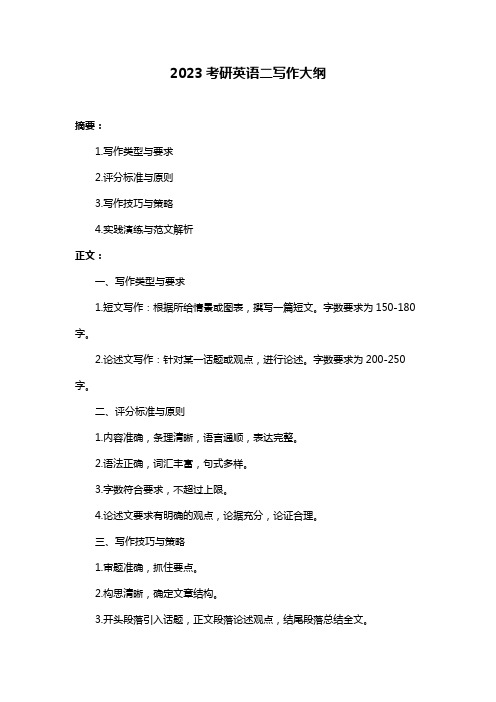
2023考研英语二写作大纲
摘要:
1.写作类型与要求
2.评分标准与原则
3.写作技巧与策略
4.实践演练与范文解析
正文:
一、写作类型与要求
1.短文写作:根据所给情景或图表,撰写一篇短文。
字数要求为150-180字。
2.论述文写作:针对某一话题或观点,进行论述。
字数要求为200-250字。
二、评分标准与原则
1.内容准确,条理清晰,语言通顺,表达完整。
2.语法正确,词汇丰富,句式多样。
3.字数符合要求,不超过上限。
4.论述文要求有明确的观点,论据充分,论证合理。
三、写作技巧与策略
1.审题准确,抓住要点。
2.构思清晰,确定文章结构。
3.开头段落引入话题,正文段落论述观点,结尾段落总结全文。
4.使用恰当的过渡词汇,使文章连贯。
5.注意行文规范,避免抄袭。
四、实践演练与范文解析
1.针对不同类型的写作题目,进行实践演练。
2.分析范文,了解优秀文章的结构、语言和表达方式。
3.对照评分标准,自我评估,不断提高写作水平。
英语专业毕业论文写作教学大纲简介

*
教学方法及评估标准
01
课堂面授、课堂讨论、网络资源利用和互动
教学方法:
02
课堂出勤率8%,平时作业及课内外互动22%,毕业论文70%
教学评估:
03
< 60(不及格);60-69(及格);70-84(中等);85-92(良好);93-100(优秀)
评分标准:
*
毕业论文的基本概念
论文(Thesis) 选题(Subject) 论题(Thesis ) 主题(Theme) 话题(Topic) 提纲(Outline) 题目(Title)
*
《英语专业毕业论文写作》 教学大纲简介
第一讲:概念与要求 2011年2月23日
汇报人姓名
教学目的
了解英语专业毕业论文的基本要求
了解英语论文写作的不同过程
了解、掌握英语论文的选题和开题
了解、掌握英语论文的撰写规范
了解英语论文的评价标准
完成一篇5000字符合规范要求的英语毕业论文
01
03
02
04
05
选方向(Select a subject)
2
定题目(Choose a topic)
拟提纲(Write an outline) Weeks 2~3
写初稿(Draft) Weeks 5~7; 8~10; 11~13
复修改(Revise according to adviser)
定终稿(Finalize official copy) Week 14
*
语 言 学 语言与文化
语法(Grammar) 句法(Syntax) 词汇(Idioms, proverbs, prepositions, slangs, euphemism, net language) 比较(Languages)
英语写作实践教学大纲(完整版)
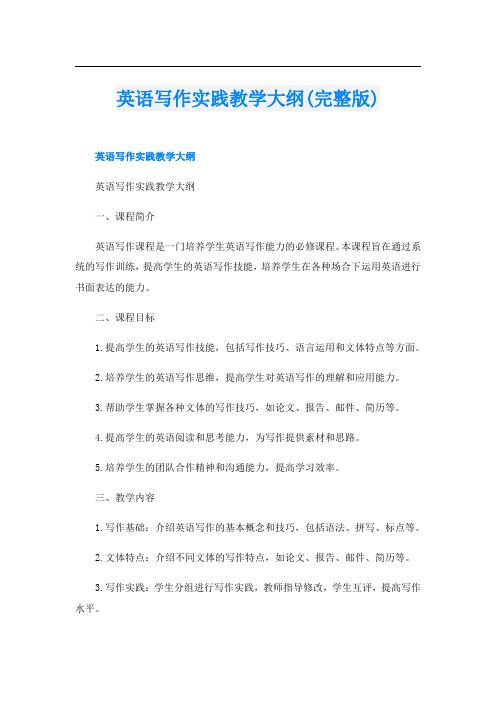
英语写作实践教学大纲(完整版)英语写作实践教学大纲英语写作实践教学大纲一、课程简介英语写作课程是一门培养学生英语写作能力的必修课程。
本课程旨在通过系统的写作训练,提高学生的英语写作技能,培养学生在各种场合下运用英语进行书面表达的能力。
二、课程目标1.提高学生的英语写作技能,包括写作技巧、语言运用和文体特点等方面。
2.培养学生的英语写作思维,提高学生对英语写作的理解和应用能力。
3.帮助学生掌握各种文体的写作技巧,如论文、报告、邮件、简历等。
4.提高学生的英语阅读和思考能力,为写作提供素材和思路。
5.培养学生的团队合作精神和沟通能力,提高学习效率。
三、教学内容1.写作基础:介绍英语写作的基本概念和技巧,包括语法、拼写、标点等。
2.文体特点:介绍不同文体的写作特点,如论文、报告、邮件、简历等。
3.写作实践:学生分组进行写作实践,教师指导修改,学生互评,提高写作水平。
4.课堂讨论:组织课堂讨论,分享优秀范文,分析写作难点,提升学生写作能力。
5.拓展阅读:推荐相关英文文献和书籍,拓宽学生阅读视野,为写作提供素材。
四、教学方法1.课堂讲解:教师通过讲解理论知识,帮助学生掌握英语写作的基本技巧和方法。
2.小组讨论:组织小组讨论,鼓励学生分享自己的写作经验和思路,互相学习。
3.案例分析:通过分析优秀范文和写作案例,帮助学生掌握不同文体的写作技巧和要点。
4.互动问答:鼓励学生提问和回答问题,促进师生互动,提高教学质量。
5.课堂互动:通过课堂互动活动,如角色扮演、情境模拟等,提高学生的英语表达能力和应用能力。
6.作业布置:根据教学进度和教学目标,布置适量的课后作业,巩固学生所学知识。
7.教学评估:采用多种评估方式,如平时作业、课堂表现、小组讨论等,全面评估学生的英语写作水平。
8.教学反馈:根据评估结果,及时向学生反馈教学情况,提供改进建议和指导,帮助学生提高英语写作能力。
9.实践教学:组织实践活动,如英语作文比赛、英文写作培训等,为学生提供实践机会,拓展学生视野和知识面。
英语写作》 教学大纲
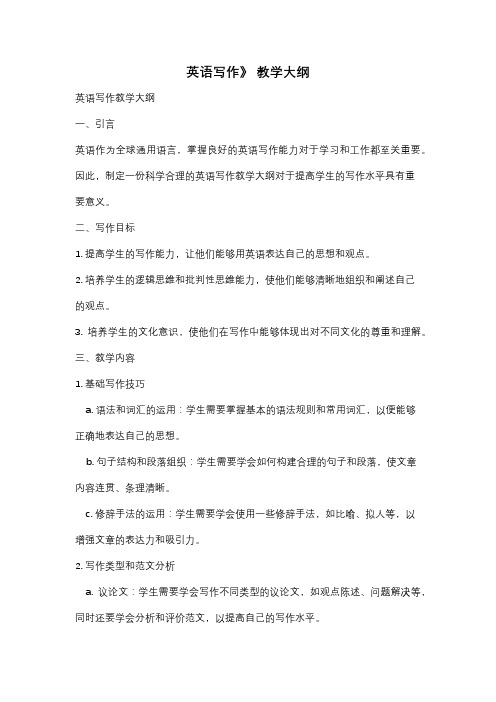
英语写作》教学大纲英语写作教学大纲一、引言英语作为全球通用语言,掌握良好的英语写作能力对于学习和工作都至关重要。
因此,制定一份科学合理的英语写作教学大纲对于提高学生的写作水平具有重要意义。
二、写作目标1. 提高学生的写作能力,让他们能够用英语表达自己的思想和观点。
2. 培养学生的逻辑思维和批判性思维能力,使他们能够清晰地组织和阐述自己的观点。
3. 培养学生的文化意识,使他们在写作中能够体现出对不同文化的尊重和理解。
三、教学内容1. 基础写作技巧a. 语法和词汇的运用:学生需要掌握基本的语法规则和常用词汇,以便能够正确地表达自己的思想。
b. 句子结构和段落组织:学生需要学会如何构建合理的句子和段落,使文章内容连贯、条理清晰。
c. 修辞手法的运用:学生需要学会使用一些修辞手法,如比喻、拟人等,以增强文章的表达力和吸引力。
2. 写作类型和范文分析a. 议论文:学生需要学会写作不同类型的议论文,如观点陈述、问题解决等,同时还要学会分析和评价范文,以提高自己的写作水平。
b. 描写文:学生需要学会运用生动的语言和细腻的描写,使读者能够感受到文章所描绘的事物或场景。
c. 记叙文:学生需要学会运用故事性的叙述方式,使文章更具吸引力和可读性。
3. 文化意识和跨文化交流a. 学生需要了解不同文化之间的差异和相似之处,以避免在跨文化交流中产生误解或冲突。
b. 学生需要学会在写作中体现出对不同文化的尊重和理解,以增强自己的文化意识和国际视野。
四、教学方法1. 课堂讲授:教师通过讲解基本的写作技巧和范文分析,帮助学生掌握写作的基本要领。
2. 练习和写作:学生通过大量的写作练习,提高自己的写作能力。
教师可以提供一些写作题目和指导,帮助学生更好地完成写作任务。
3. 互动讨论:教师可以组织学生之间的讨论和交流,让学生在互动中学习和提高。
五、评估方式1. 作业评估:教师可以通过批改学生的作业,评估他们的写作水平和进步情况。
2. 课堂表现:教师可以通过观察学生的课堂表现,评估他们的参与度和学习态度。
硕士研究生入学考试大纲--821英语语言学基础与英文写作

全国硕士研究生入学统一考试英语语言学基础与英语写作考试大纲目录I 考查目标 (1)II 考试形式和试卷结构 (1)III 考查内容 (1)IV. 题型示例及参考答案 (2)《英语语言学基础与英语写作》考试大纲I 考查目标全国硕士研究生入学统一考试自命题科目《英语语言学基础与英语写作》考试是为我校招收教育专业硕士学科教学(英语)方向研究生而设置的具有选拔性质的考试科目。
其目的是科学、公平、有效地测试考生是否具备攻读该专业方向所必须的基本素质、一般能力和培养潜能,以利用选拔具有发展潜力的优秀人才入学,为国家的经济建设培养具有良好职业道德、法制观念和国际视野、具有较强分析与解决实际问题能力的高层次、应用型、复合型的外语教育人才。
考试测试考生掌握主要语言学派的基础知识、语言学(包括各语言学分支)的基础知识、语言学理论的基本应用能力,考察学生掌握词汇的基本概念、构词法、词汇使用等,考察考生的英语写作能力,考查考生能运用这些概念与理论分析解决教学中与语言学有关问题的能力。
具体要求考生:应该理解并掌握语言学、词汇学、写作的基本属性及规律,掌握语言学定义、特征;语音学定义、特征、分类;音素、音位和音位变体及音位学规则;形态学、句法学、语义学、语用学的定义、分类、变化规则;语言的变化、语言与文化规则;二语习得及语言与大脑的基本概念和基本应用。
掌握词汇学定义、历史、形式、意义关系、词典应用、语篇词汇的理念和发展。
考察英语写作能力。
II 考试形式和试卷结构一、试卷满分及考试时间试卷满分为150分,考试时间180分钟。
二、答题方式闭卷、笔试,用英文解答各类试题,不容许使用各类词典。
三、试卷内容与题型结构正误判断(5个,每题2分,共10分)选择题(5个,每题2分,共10分)名词解释(6小题,每题5分,共30分)简答题(6小题,每题10分,共60分)英文写作(1题,共40分)假如每题分数有变化,变化范围亦不大。
III 考查内容1. 语言和语言学:语言和语言学的定义、范畴、识别特征、重要区分等。
英语写作sentence outline和topic outline

英语写作sentence outline和topic outline 在英语写作中,大纲(outline)是一种组织和规划文章内容的有效工具。
它有助于作者明确文章的主题、要点和结构,并使文章更有条理和易于理解。
以下是英语写作中常用的两种大纲类型:Sentence Outline(句子大纲):句子大纲是以句子为单位来呈现文章的结构和要点。
每个要点下面可能包含一个或多个句子,用于详细阐述或支持主题句。
句子大纲通常用于较短的文章或段落,以便更具体地规划内容和组织思路。
例如,以下是一个关于“健康饮食”主题的句子大纲:I. IntroductionA. 介绍健康饮食的重要性B. 提出本文的主题:如何保持健康饮食II. Benefits of Healthy EatingA. 健康饮食对身体的益处B. 健康饮食对心理的益处III. Tips for Healthy EatingA. 多吃蔬菜水果B. 适量摄入蛋白质和脂肪C. 控制糖分和盐分的摄入D. 注意饮食的份量和频率IV. ConclusionA. 总结健康饮食的重要性B. 鼓励读者实践健康饮食2. Topic Outline(主题大纲):主题大纲是以主题或论点为单位来呈现文章的结构和要点。
每个要点下面可能包含一个或多个子主题或子论点,用于详细阐述或支持主题或论点。
主题大纲通常用于较长或较为复杂的文章,以便更全面地展开主题和组织思路。
例如,以下是一个关于“气候变化”主题的Topic Outline:I. IntroductionA. 介绍气候变化的现象和影响B. 提出本文的主题:应对气候变化的措施II. Causes of Climate ChangeA. 人为因素:工业排放、农业活动等B. 自然因素:太阳辐射、自然灾害等III. Effects of Climate ChangeA. 对自然环境的影响:极端天气、物种灭绝等B. 对人类社会的影响:粮食安全、经济发展等IV. Solutions to Climate ChangeA. 减少温室气体排放:能源转型、提高能源效率等B. 适应气候变化:投资基础设施、改善生态系统等C. 国际合作与政策制定:共同应对气候挑战等V. ConclusionA. 总结气候变化的严重性和应对措施的重要性B. 强调个人和社会的责任和行动对于应对气候变化的作用。
2024河南中考英语作文大纲
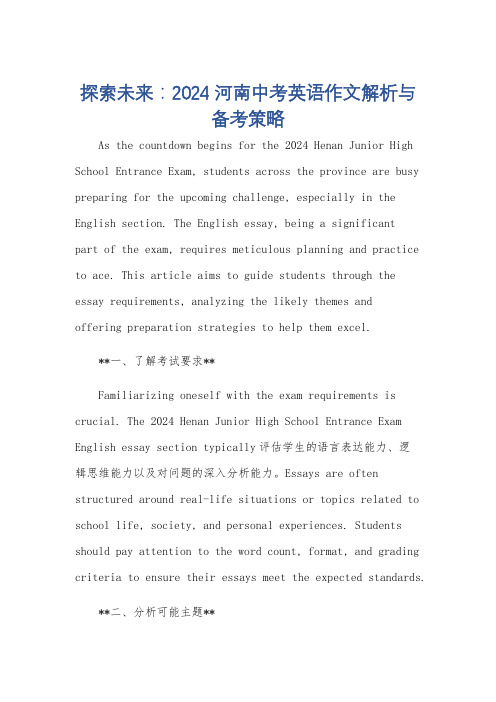
探索未来:2024河南中考英语作文解析与备考策略As the countdown begins for the 2024 Henan Junior High School Entrance Exam, students across the province are busy preparing for the upcoming challenge, especially in the English section. The English essay, being a significantpart of the exam, requires meticulous planning and practice to ace. This article aims to guide students through the essay requirements, analyzing the likely themes andoffering preparation strategies to help them excel.**一、了解考试要求**Familiarizing oneself with the exam requirements is crucial. The 2024 Henan Junior High School Entrance Exam English essay section typically评估学生的语言表达能力、逻辑思维能力以及对问题的深入分析能力。
Essays are often structured around real-life situations or topics related to school life, society, and personal experiences. Students should pay attention to the word count, format, and grading criteria to ensure their essays meet the expected standards. **二、分析可能主题**Given the focus on real-life applications, students should expect essay topics that are relevant and contemporary. Topics could range from environmental protection, technology and its impact on daily life, to social issues such as bullying and cyber security. Understanding these potential themes will help students prepare more effectively.**三、备考策略****1. 积累词汇和句型**:A rich vocabulary and variety of sentence structures are essential for writing an impressive essay. Students should regularly practice using new words and complex sentences in their writing.**2. 阅读优秀范文**:Reading well-written essays can provide valuable insights into effective writing techniques. Students can learn from the structure, language use, and ideas presented in these examples.**3. 练习写作**:Regular practice is key to improving writing skills. Students should attempt to write essays on different topics, focusing on time management and adheringto the word count.**4. 反思与修改**:After completing an essay, students should take time to reflect on their work and identify areas for improvement. Seeking feedback from teachers or peers can also be beneficial.**四、结语**Preparing for the 2024 Henan Junior High School Entrance Exam English essay section requires a strategic approach. By understanding the exam requirements, analyzing potential themes, and implementing effective preparation strategies, students can confidently face this challenge and achieve their desired results. Remember, practice makes perfect, so keep writing and refining your essays to excel in this section!**探索未来:2024河南中考英语作文解析与备考策略** 随着2024年河南中考的倒计时开始,全省的学生们正在为即将到来的挑战紧张备考,尤其是英语作文部分。
- 1、下载文档前请自行甄别文档内容的完整性,平台不提供额外的编辑、内容补充、找答案等附加服务。
- 2、"仅部分预览"的文档,不可在线预览部分如存在完整性等问题,可反馈申请退款(可完整预览的文档不适用该条件!)。
- 3、如文档侵犯您的权益,请联系客服反馈,我们会尽快为您处理(人工客服工作时间:9:00-18:30)。
Chapter One The Paragraph (1)
Ⅰ.Introductio (1)
Ⅱ.The Topic Sentence (1)
Ⅲ.The Concluding Sentence (1)
Ⅳ.Unity (1)
Ⅴ.Coherence (1)
Chapter One The Paragraph
Ⅰ.Introduction
In summary, a well-written paragraph contains five elements: a topic sentence, supporting sentences, a concluding sentence, unity and coherence.
Ⅱ.The Topic Sentence
Every good paragraph has a topic sentence, which clearly states the controlling idea of the paragraph.
There are three important points to remember about a topic sentence.
1. A topic sentence is a complete sentence.
2. A topic sentence contains both a topic and a controlling idea.
3. A topic sentence is the most general statement in the paragraph.
A topic sentence has two essential parts: the topic and the controlling idea. A topic sentence should be neither too general nor too specific. Do not include too many unrelated ideas in the topic sentence.
Ⅲ.The Concluding Sentence
A concluding sentence serves three purposes:
1. It signals the end of the paragraph.
2. It summarizes the main points of the paragraph.
3. It gives a final comment on the topic and leaves the reader with the most important ideas to think about.
Ⅳ.Unity
Another important element of a good paragraph is unity, which means the only one main idea is discussed. The second part of unity is that is stated in the topic sentence.
Ⅴ.Coherence
Coherence means being connected naturally and logically by a common principle.
There are three ways to achieve coherence. The first way, repetition of key nouns; the second way, use of consistent pronouns; and the third way, transitions.
Transition signals can be categorized into three groups by grammatical function. The first, sentence connectors; the second, clause connectors; and the third, a mixed group called others.。
